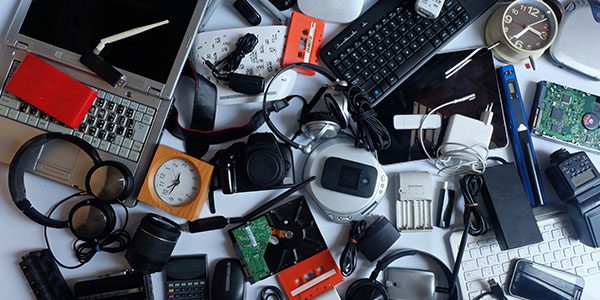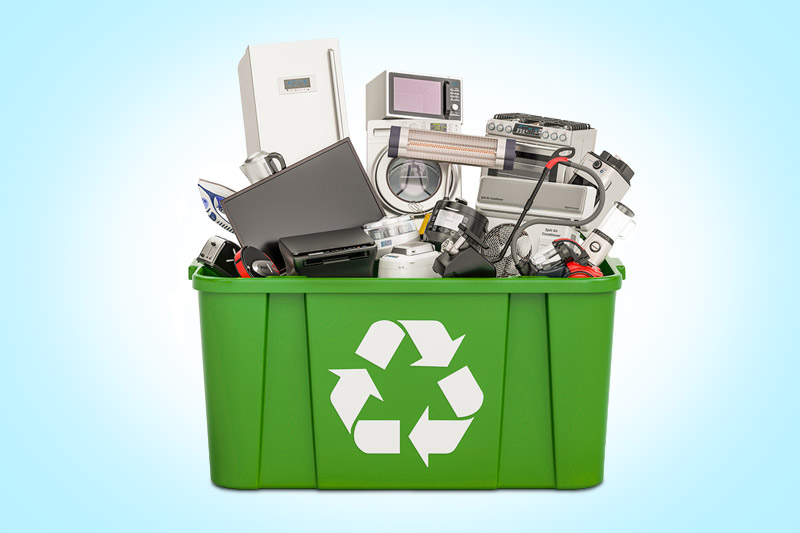Eco-Friendly Electronic Devices Recycling Solutions: Count On the R2 Certification Criterion
Eco-Friendly Electronic Devices Recycling Solutions: Count On the R2 Certification Criterion
Blog Article
Elevate Your E-Waste Management With R2 Certification: a Thorough Introduction
One trick method to raise e-waste monitoring techniques is by achieving R2 accreditation. By discovering the processes and benefits connected with R2 qualification, a much deeper understanding of how it can transform e-waste monitoring approaches emerges, dropping light on a path towards sustainability and moral disposal techniques.
Importance of E-Waste Administration

When e-waste is not handled properly, these poisonous compounds can permeate into the environment, creating harm to wild animals and possibly entering the food cycle, posing dangers to human wellness. The inappropriate disposal of e-waste contributes to contamination and greenhouse gas emissions, exacerbating environment adjustment and environmental degradation.

Advantages of R2 Accreditation

First of all, R2 qualification boosts integrity by showcasing an organization's dedication to lasting techniques. It guarantees consumers, companions, and stakeholders that the company sticks to strict criteria for e-waste management - r2 certification. This integrity can lead to enhanced depend on and boosted relationships with clients that focus on ecological responsibility
Secondly, R2 accreditation assists minimize risks linked with incorrect e-waste disposal. By following the stringent standards stated by the certification, organizations can lessen the probability of data violations, ecological contamination, and legal effects. This positive strategy safeguards the company's reputation and lessens possible responsibilities.
Last but not least, R2 certification shows a commitment to ecological stewardship - r2 certification. By responsibly managing electronic waste with accredited processes, organizations add to the conservation of resources, reduction of pollution, and promo of a round economy. This commitment not only profits the setting yet likewise lines up with progressing consumer expectations for lasting service methods
R2 Accreditation Process Overview
Having actually developed the benefits of R2 certification in promoting reputation, danger mitigation, and ecological stewardship, it is necessary to currently detail the comprehensive process entailed in obtaining this certification. The R2 certification process begins with a complete evaluation of the company's operational plans and procedures to ensure compliance with the R2 standard. web This preliminary evaluation is important in identifying any kind of spaces that need to be dealt with before continuing even more.
As soon as the organization's practices line up with the R2 conventional requirements, an independent third-party auditor carries out an on-site audit to review the implementation and performance of these methods. This audit consists of an extensive testimonial of paperwork, meetings with personnel, and physical inspections of facilities to validate compliance.
Adhering to a successful audit, the company receives an accreditation decision based on the auditor's searchings for. If approved, the organization is approved R2 certification, demonstrating its dedication to liable e-waste administration. It is vital to note that preserving R2 certification requires continuous conformity with the standard's demands and routine audits to ensure continued adherence to finest techniques in e-waste recycling and disposal.
Key Requirements for R2 Conformity
A necessary aspect of accomplishing R2 compliance is making certain that all digital waste (e-waste) processing facilities satisfy rigid ecological and safety requirements. To follow R2 needs, organizations should stick to crucial standards that concentrate on liable e-waste management practices. These criteria include carrying out a recorded ecological, wellness, and safety and security monitoring system, ensuring the secure handling of data-containing devices, and conducting extensive downstream due persistance to track the final destination of e-waste products.
Furthermore, R2 conformity demands the appropriate testing, repair, and recycling of electronic tools to expand its useful life and minimize ecological effect. Facilities seeking R2 qualification have to additionally focus on worker health and wellness by providing necessary training, individual safety equipment, and a secure workplace. click here for more In addition, preserving comprehensive records of e-waste handling tasks and routinely undergoing audits by approved certifying bodies are important parts of demonstrating continuous compliance with R2 standards.
Influences of Sustainable E-Waste Practices
The implementation of lasting e-waste methods according to R2 conformity not only guarantees ecological and security standards are met but additionally considerably impacts the general lifecycle of electronic products. By adhering to R2 standards, digital waste monitoring processes come to be a lot more efficient, minimizing the environmental impact of electronic items. Lasting e-waste methods help with the correct disposal of electronic parts, making sure that hazardous materials are taken care of properly and do not finish up polluting the setting.
Additionally, sustainable e-waste methods can contribute to task production in the recycling and repair markets, fostering economic development while promoting ecological responsibility. Generally, the fostering of lasting e-waste practices under R2 accreditation offers as a critical action in the direction of attaining an extra Read Full Article eco sustainable electronic devices industry.
Final Thought
Finally, applying proper e-waste monitoring techniques is critical for environmental sustainability and source preservation. R2 certification plays a crucial role in ensuring liable handling and disposal of electronic waste. By sticking to the strict standards set forth by R2 standards, organizations can not only reduce their ecological impact however likewise add to a much more sustainable future for generations ahead.
One secret technique to boost e-waste administration practices is by attaining R2 accreditation. By exploring the benefits and procedures associated with R2 accreditation, a much deeper understanding of just how it can transform e-waste administration techniques arises, losing light on a path towards sustainability and moral disposal practices.
The R2 accreditation process starts with a comprehensive testimonial of the company's functional plans and procedures to make certain conformity with the R2 criterion. If approved, the company is approved R2 certification, demonstrating its commitment to liable e-waste management. In general, the adoption of sustainable e-waste practices under R2 certification offers as an important action towards achieving an extra ecologically sustainable electronic devices sector.
Report this page